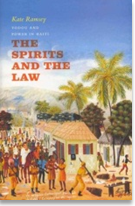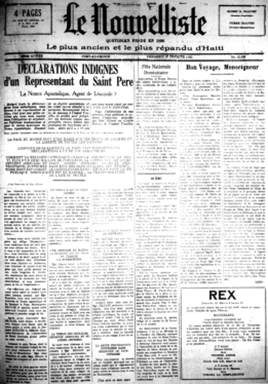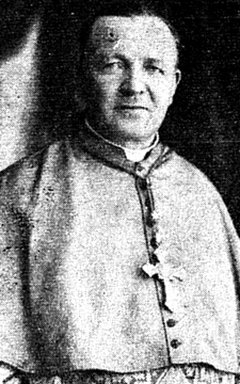 "The Anti-Superstition Campaign" by Kate Ramsey, Ph.D.
"The Anti-Superstition Campaign" by Kate Ramsey, Ph.D.
Ramsey is Assistant Professor of History at the University of Miami. She is the author of The Spirits and the Law: Vodou and Power in Haiti (2011).
The late 1920s through the early 1940s were years of crisis for many practitioners of the Vodou religion across Haiti. The repression of popular ritual practices during the U.S. occupation of Haiti between 1915-1934 was followed in 1935 by the post-occupation Haitian state’s tightening of the penal regime against what were now constructed as "pratiques superstitieuses" (superstitious practices). Then, in 1940-42 this new law became the legal basis for the Roman Catholic Church’s most severe campaign against Vodou to date, with initial military backing from the government of Elie Lescot. Church manuals distributed to priests (predominantly French) across the country asserted that the "campagne anti-superstitieuse" (anti-superstition campaign) had its roots in a wave of popular renunciations of "superstition" beginning in 1939 in and around a parish in central Haiti, with participants calling themselves "rejete" ("rejectors"). Yet catechisms printed in those same manuals, along with newspaper reports, personal letters, and other sources suggest that the church’s campaign also needs to be understood as an effort to combat the spread and influence of Protestantism in post-occupation Haiti.
It was when the church attempted to extend its "anti-superstitious missions" to Port-au-Prince in February 1942 that the controversies surrounding the campaign intensified. The Haitian press became yet more critical when the apostolic nuncio, Monsignor Silvani, gave an interview to the Dominican newspaper Listin Diario that month in which he praised the modernity and progress of the Dominican Republic under the Rafael Leonidas Trujillo regime while portraying Haiti as a country which was "little by little...overthrowing superstition" through the church’s "crusade" (see link). Disturbances at Port-au-Prince churches in February and March 1942 were the pretext for the removal of Haitian state support for the campaign, which, in practical terms, had been already withdrawn; the Catholic hierarchy in Haiti ended all "anti-superstitious missions" shortly thereafter.
Jacques Roumain—distinguished writer, co-founder the Parti Communiste Haïtien (PCH) and, at the height of the campagne anti-superstitieuse, founder of the Haitian Bureau d’Ethnologie—was the church’s most prominent and prolific critic during and following the campaign. In March 1942 Roumain wrote a three-part article in Le Nouvelliste (the first of which is linked here) entitled "Sur les Superstitions" which became the basis for his A propos de la campagne 'anti-superstitieuse’/ Las Supersticiones, published in French and Spanish later that year.


